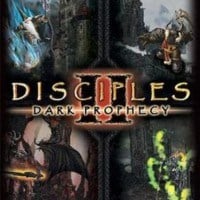Disciples 2 Was Heroes 3's Fiercest Competitor; Darker, Rougher and Almost as Playable
Today, the series' position has weakened, but when Disciples 2 came out, the brand was considered one of the most dangerous competitors to Heroes 3. It was similar yet different enough for turn-based strategy enthusiasts to reckon with the title.
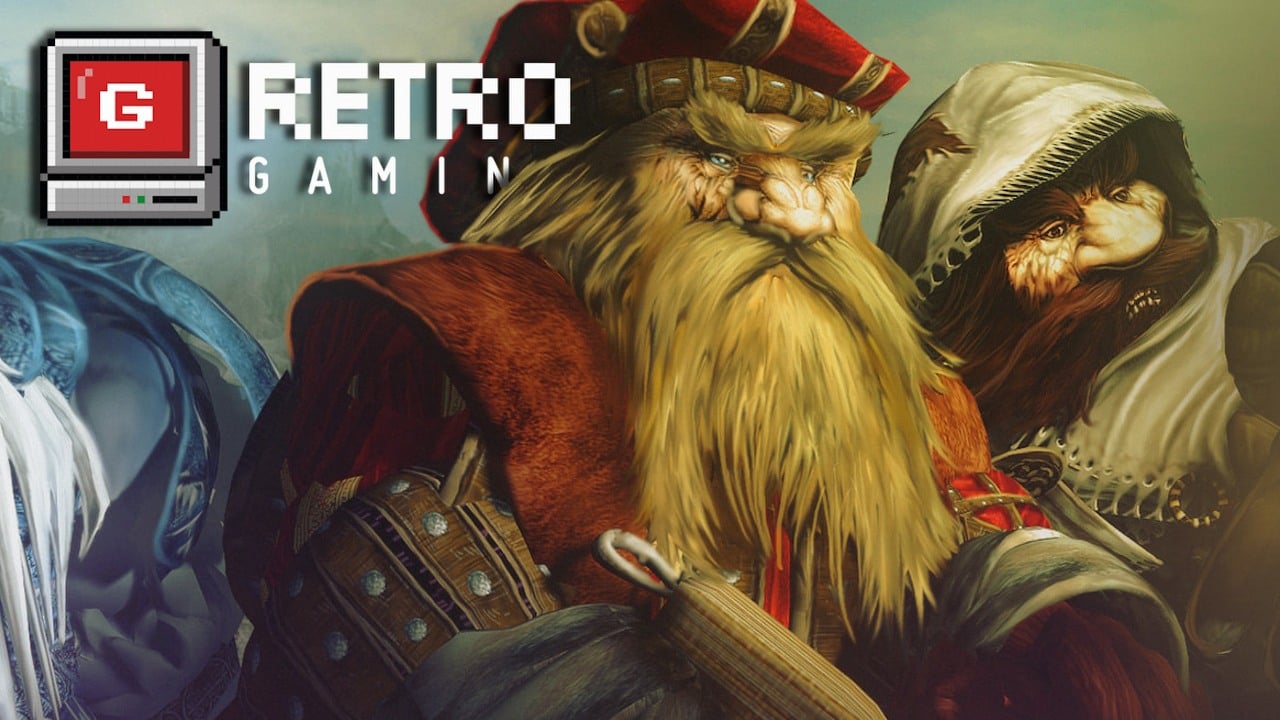
Heroes of Might and Magic 3 is a phenomenon. A game that is always alive, with a strong gameplay foundation, further developed by dedicated fans. It's so universal that it's almost like the go-to board game when you want to add some variety to a geeky party. Horn of the Abyss ensured that Heroes will stay with us for ages to come, despite strong competition such as Songs of Conquest. Will the upcoming new Heroes change this? I doubt that.
I remember the times when nothing was certain. Heroes 4 – no matter how good it turned out – was bugged and so different from the beloved third part that the series' position weakened. At that time, Strategy First made a strong hit that almost rivaled Heroes 3, and certainly outperformed Heroes 4 and other contenders from that time, such as Age of Wonders 2 and Etherlords. Disciples 2: Dark Prophecy not only improved the ideas present in the genre but did so with such style that it momentarily outshone all other turn-based strategy games combined with RPG elements.
Disciples 2 - the dark cousin of Heroes
That was the edgy cousin who worked for his five minutes of fame. The first thing that made Disciples 2 stand out from the competition was its tar-thick atmosphere. The artistic design brought to mind Brotherhood of The Wolf and Diablo, infused with elements from Central and Eastern Europe as well as Scandinavia. Even the most idyllic territories were portrayed in a harsh, melancholic way. Maps artists, characters, and units graphic designers, and also sound engineers, musicians, animators, bent over backward to create a unique atmosphere. Instead of a fairy tale, we have a dark tale told around a campfire. A tale about monsters, who sometimes are right. About the last righteous ones, who try to accomplish anything in a corrupt empire. About revenge of biblical proportions and about betrayals.
The plot in Disciples 2 is a direct sequel to the first installment, albeit taking place several decades later. It's a well-written story, especially considering that it's subordinated to turn-based battles. The atmosphere matters, and the dramatis personae are easy to remember, especially since each campaign somehow intertwines with another. In the base game, we get to know four factions - The Legions of the Damned (demons), The Undead Hordes (duh), The Mountain Clans (dwarves), and The Empire (humans).
Each of the parties is guided by quite reasonable – from their point of view – motivations in the name of higher powers, survival and domination. The screenwriters even wrote a few decent plot twists. Dark epics get new chapters in the expansions Servants of the Dark and Guardians of the Light. In the third expansion, The Rise of the Elves, the titular faction is introduced with its own city, technologies, units, and another bitter story to tell.
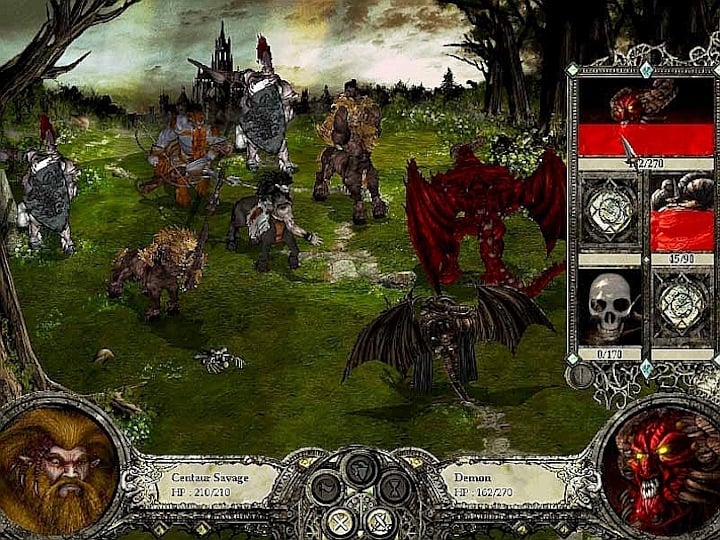
Disciples 2 - the same, but different
At first glance, in Disciples 2 we played similarly to Heroes 3 or 4. In the game, we have a strategic map that allows us to command our units, gather resources, issue attack orders, and explore the map. We are conducting research and expansion in the city. During the battle, we move to a separate screen to send the opponents back to the forces they trusted in fate. However, the devil is in the details - and there are so many of them that Disciples 2 has earned a completely separate identity.
The protagonist, as in Heroes 4, takes a direct part in the fight and is a unit that we import from scenario to scenario. Spells developed or purchased from other factions are cast before the battle, during the clashes we only use potions and artifacts. The combat also looks somewhat different - seemingly more static, as we don't move the units, but only attack what is within their range, and the units themselves consist of a maximum of 6 units. Weak, not very spectacular? Not at all!
Firstly, the design of every unit that is meant to inspire respect, does so. These are impressive warriors, witches, and other creatures. Above all, they differ significantly from each other, and we become attached to them, as they progress with the script even if we don't give them names. And I'm not just talking about regular leveling up - each unit has its own evolution tree and evolves depending on the buildings we construct in the capital (although we can block this and allow it to gain new levels while staying at a "lower level").
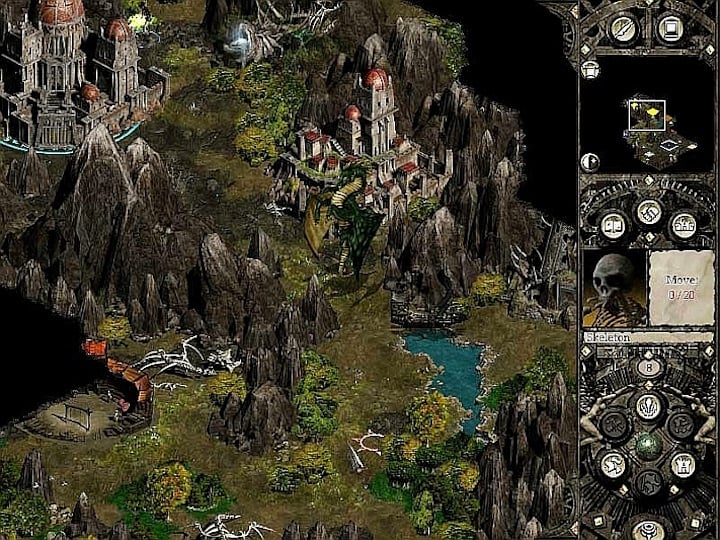
This solution brilliantly combines the RPG aspect of the game with the economic one, making us care about both a specific - often scenario-dependent - plan for the development of the city, and also causing us to become attached to a well-trained, powerful unit that we have developed throughout the entire scenario (it's a pity that the "privates" don't move from quest to quest, unlike the heroes).
Interestingly, we only expand the capitals of factions with specific buildings. We don't occupy others in order to entrench ourselves and benefit from their technology, but rather to ultimately eliminate the opponent from the board. We only expand the other cities with stronger fortifications, allowing us to garrison them with more soldiers. The cities are used for recruiting more units and heroes, but also for passively expanding our territory - from capitals, ordinary cities, and paths, which specialized heroes stick in, our influence spreads slowly, like a wave. Only if we take over the territory, can we profit from the gold mines and mana (we can buy spells with mana, for instance).
Not everyone was pleased with it, as it theoretically restricts strategic possibilities and the ability to tinker with the army composition, but it does provide greater coherence - so you must decide for yourselves if this is suitable for you. I accepted this setback and continued playing. Diplomacy works fairly well, although naively, enabling us to purchase a moment of peace from hostile invasions (sometimes it is also necessary to accomplish the objective in the storyline mission).
Disciples 2 - always second, but still great
Overall, Disciples 2 is equipped with a lot of intriguing micromechanics that resemble Heroes, but at the same time, they do everything their own way – and in such an engaging way that the game pulls you in for "just one more turn" with a similar force as the legendary Heroes series. Almost. Disciples 2 is darker, and therefore less relaxing and casual, than its cult competitor. I know that for many people, this, as well as the fact that we can only use our own units and cannot recruit enemy units after taking over a city, makes the gameplay a bit less predictable.
I get this. However, when Disciples 2 entered my life, it brought me much more gaming joy. Honestly? Heroes works better as a game with friends, while Disciples 2 is easier to get into when you want to burn some time alone in a turn-based game.
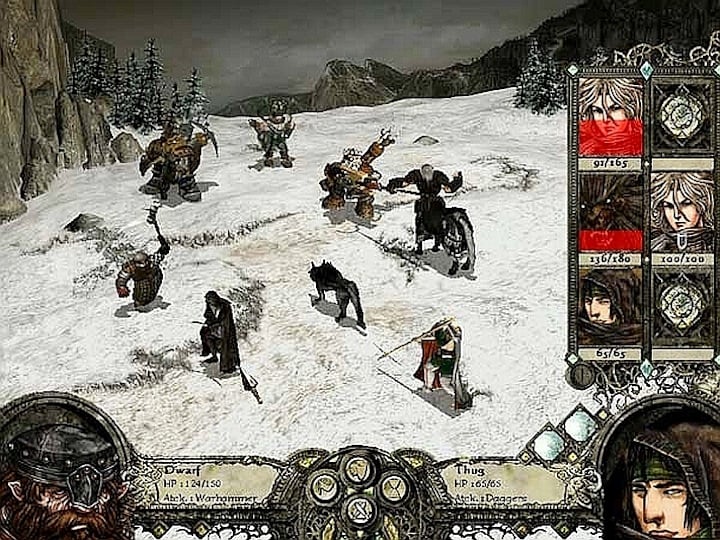
How to play Disciples 2 today?
You can easily purchase the game on Steam, where it is available in the Gallean's Return edition with a bundle including two expansions, for $5.99. The game is also available on GOG in the Gold edition, which includes all three expansions, at $9.99. However, until November 5, you can take advantage of an 80% discount and purchase it for $1.99.
After years of playing, the only thing that annoys me is probably the long turn-loading time (it's not terrible, but they could speed it up). However, the only real issue is that the discussed strategy occasionally malfunctions and refuses to run on Windows 10 (and likely on 11 as well). The guide from the GOG forum helped me.
If you are ready to do a few operations with files - it will take a few minutes - then you are about to experience one of the best turn-based strategies in the style of Heroes 3. In my eyes, even Songs of Conquest doesn't reach this level yet, and it's a great game. Unfortunately, the next installment, Disciples 3, failed to live up to expectations and turned out to be a worse and less cohesive title. In turn, Disciples: Liberation from 2021 was a palatable, but unoriginal spin-off offering gameplay like a simplified tactical RPG. It's a shame that it was out of place and went unnoticed. Nonetheless, what Dark Prophecy gave along with the expansions, no one will take away from Disciples. The only thing left is to take advantage of it. And maybe you and your friends will get into it.
- Strategy First
- oldschool / retro
- turn-based strategies
- Retro Gaming
0

Author: Hubert Sosnowski
He joined GRYOnline.pl in 2017, as an author of texts about games and movies. Learned how to write articles while working for the Dzika Banda portal. His texts were published on kawerna.pl, film.onet.pl, zwierciadlo.pl, and in the Polish Playboy. Has published stories in the monthly Science Fiction, Fantasy, and Horror magazine, as well as in the first volume of the Antologii Wolsung. Lives for "middle cinema" and meaty entertainment, but he won't despise any experiment or Fast and Furious. In games, looks for a good story. Loves Baldur's Gate 2, but when he sees Unreal Tournament, Doom, or a good race game, the inner child wakes up. In love with sheds and thrash metal. Since 2012, has been playing and creating live action role-playing, both within the framework of the Bialystok Larp Club Zywia, and commercial ventures in the style of Witcher School.
Latest News
- End of remote work and 60 hours a week. Demo of Naughty Dog's new game was born amid a crunch atmosphere
- She's the new Lara Croft, but she still lives in fear. Trauma after Perfect Dark changed the actress' approach to the industry
- „A lot has become lost in translation.” Swen Vincke suggests that the scandal surrounding Divinity is a big misunderstanding
- Stuck in development limbo for years, ARK 2 is now planned for 2028
- Few people know about it, but it's an RPG mixing Dark Souls and NieR that has received excellent reviews on Steam, and its first DLC will be released soon
